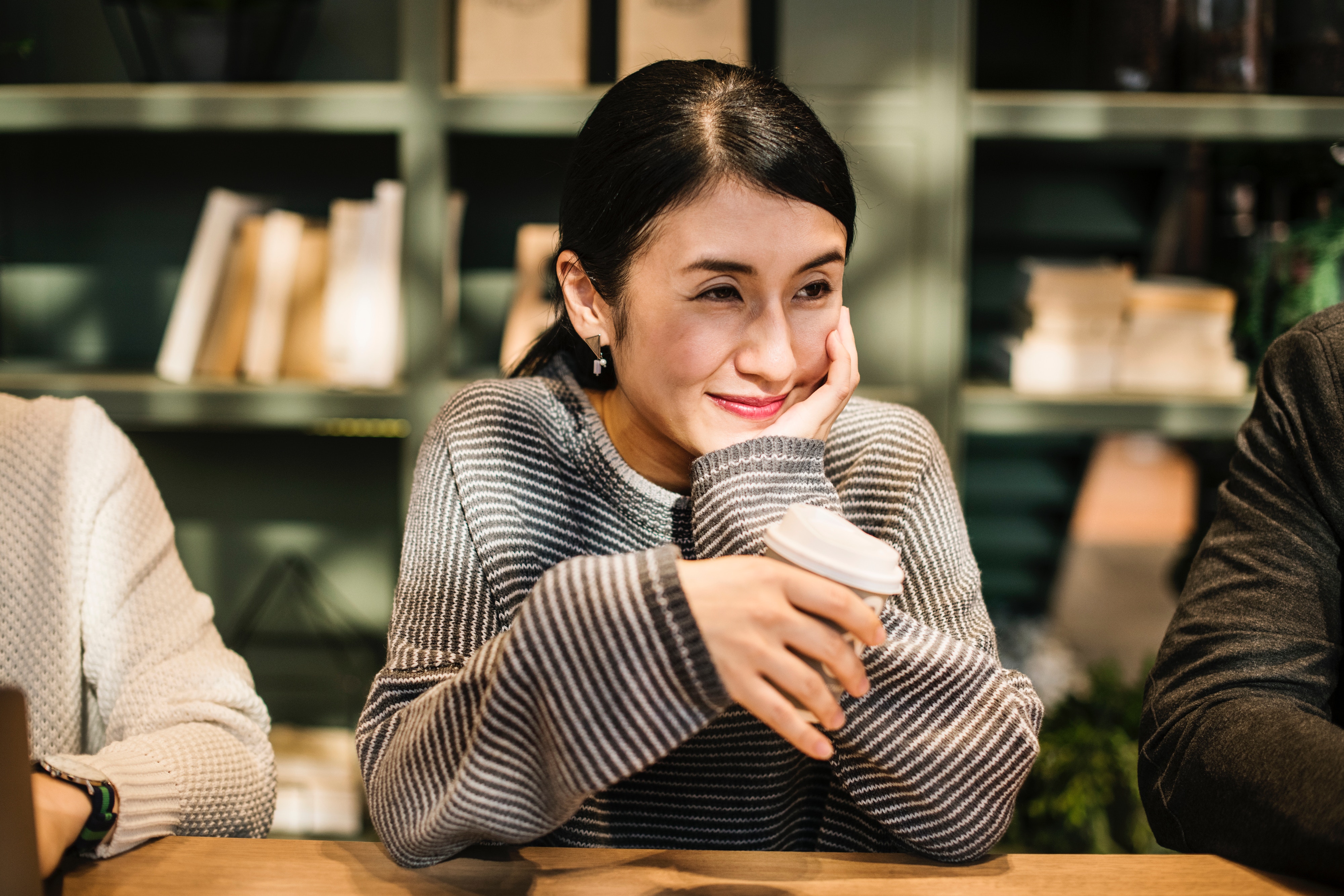Is CBD Coffee Actually As Beneficial As Everyone Says It Is?
But if you know anything about CBD—the ultra-buzzy, non-psychoactive cannabis compound that's credited with all sorts of health benefits—this pairing sounds like a weird one. Coffee gives you a jolt of energy, while people often use CBD to calm down. Wouldn't the combination of both just cancel each other out?
Anecdotally, at least, that doesn't seem to be the case. "What I hear from people is that they’re able to experience that nice, alert, focused energy of coffee without any of the jitters," says Jewel Zimmer, founder of "farm-to-table" cannabis and CBD oil brand Juna. I've found that to be true, personally—as someone who loves the taste (and antioxidants) of cold brew but can't drink it without feeling a little manic, I've realized that mixing CBD into my cup slightly mitigates those side effects.

But why? Well, one commonly cited (but untested) theory is that it might have something to do with a chemical in the nervous system called adenosine. "Both caffeine and CBD inhibit adenosine signaling," says neuroscientist Leigh Winters. "Adenosine acts as a central nervous system sedative, which is super useful in regulating our wake/sleep cycle. When you have a cup of coffee in the morning, it makes you feel awake and more alert because the caffeine actually blocks adenosine receptors in your brain." CBD is also believed to interact with adenosine and its receptors, but it seems to have a different impact than coffee. "What happens in the brain is that CBD delays neurons’ ability to 're-uptake' adenosine. Without getting too technical, [this] is greatly connected to reducing inflammation in the body and heart. That’s why CBD is being studied in MS, heart disease, and other inflammatory-rooted conditions," Winters says.
Yet herein lies the paradox. "So if both CBD and caffeine inhibit adenosine, then why do CBD and caffeine have seemingly opposite effects on our physiology?," Winters asks. "The answer likely lies in the fact that our rather basic understanding of the brain’s neurotransmitters really just scratches the surface of a much more complicated picture. Our brain’s pathways are never really all that straightforward." Indeed, scientists don't know for sure what happens when caffeine and CBD are consumed together, as no rigorous clinical research has been conducted on the topic.
But a few preliminary studies shed a little more light on the potential relationship between the two. One may make you think twice about the trend: It found that CBD's anti-inflammatory powers were weakened when an adenosine antagonist entered the picture—and, as mentioned before, caffeine is itself an adenosine antagonist. "It hasn’t been verified either way whether caffeine diminishes the potency of the CBD or not," says Zimmer. She also notes that drinking lots of coffee has been found to deplete the endocannabinoid system, but it's not clear whether adding CBD to the mix can help bolster the system in return. "There's still so much to learn."
And you have to consider the fact that both substances work on lots of other, independent pathways in the body too, says Wolfgang Dostmann, PhD, a professor in the department of pharmacology at University of Vermont’s Larner College of Medicine. "Since these drugs act independently, the overall outcome for the patient that consumes both drugs is very difficult to predict," he says. "The patient's state of mind, physical fitness, overall [CBD and caffeine] habit and dosages, along with the individual [CBD and caffeine] sensitivity are all factors that can swing the mood either way."
Even so, that hasn't stopped tons of people from jumping on the CBD coffee train. If you're one of them, the one thing that experts say is clear is that dose matters—both the amount of coffee you're drinking and the amount of CBD you're putting into it. For best results, says doctor of pharmacology Craig Leivent, you should start under ten milligrams of CBD per cup of coffee. "CBD has been found to be dose dependent: Too low and you aren’t going to get a response, and too high you aren’t going to get a response," says Dr. Leivent, a cofounder of CBD-infused coffee brand Flower Power Coffee Co. Even within that spectrum, your experience may differ depending on dose, says Zimmer. "CBD in a microdose [of two to ten milligrams] tends to have a lifting and focusing effect on the system. But for most people, ten milligrams is probably on the cusp of being more sedating and calming. You can take different doses for different things."
Dr. Leivent also recommends staying below five cups of coffee per day, even if the CBD is making you feel like you can handle more. "Too much caffeine is not that good for anyone, in general. You'll [still] feel the jitters with all that coffee." As for the type of CBD you use, it's really up to you. CBD coffee brands like Flower Power don't require any additional work, as the CBD is added to the beans before they're bagged. You can also buy water-soluble CBD products that will dissolve in your coffee. Different products will also give you different results, so a good rule of thumb is to start small and see how various doses and delivery methods make you feel. (After you've gotten the OK from your doctor, of course.)
The bottom line? "This is a new area of research that has a lot of unanswered questions," says Winters. "But with what we know right now, it’s not thought that CBD and coffee is a potentially harmful or life-changing combination." So if you feel like it's doing something positive for you, you're probably not compromising anything. (Except, perhaps, your bank account. Like oat milk, CBD always costs extra.)

{{post.sponsorText}}
Here's what happens when you mix CBD and alcohol—and one editor's experience getting a CBD massage.
Loading More Posts...